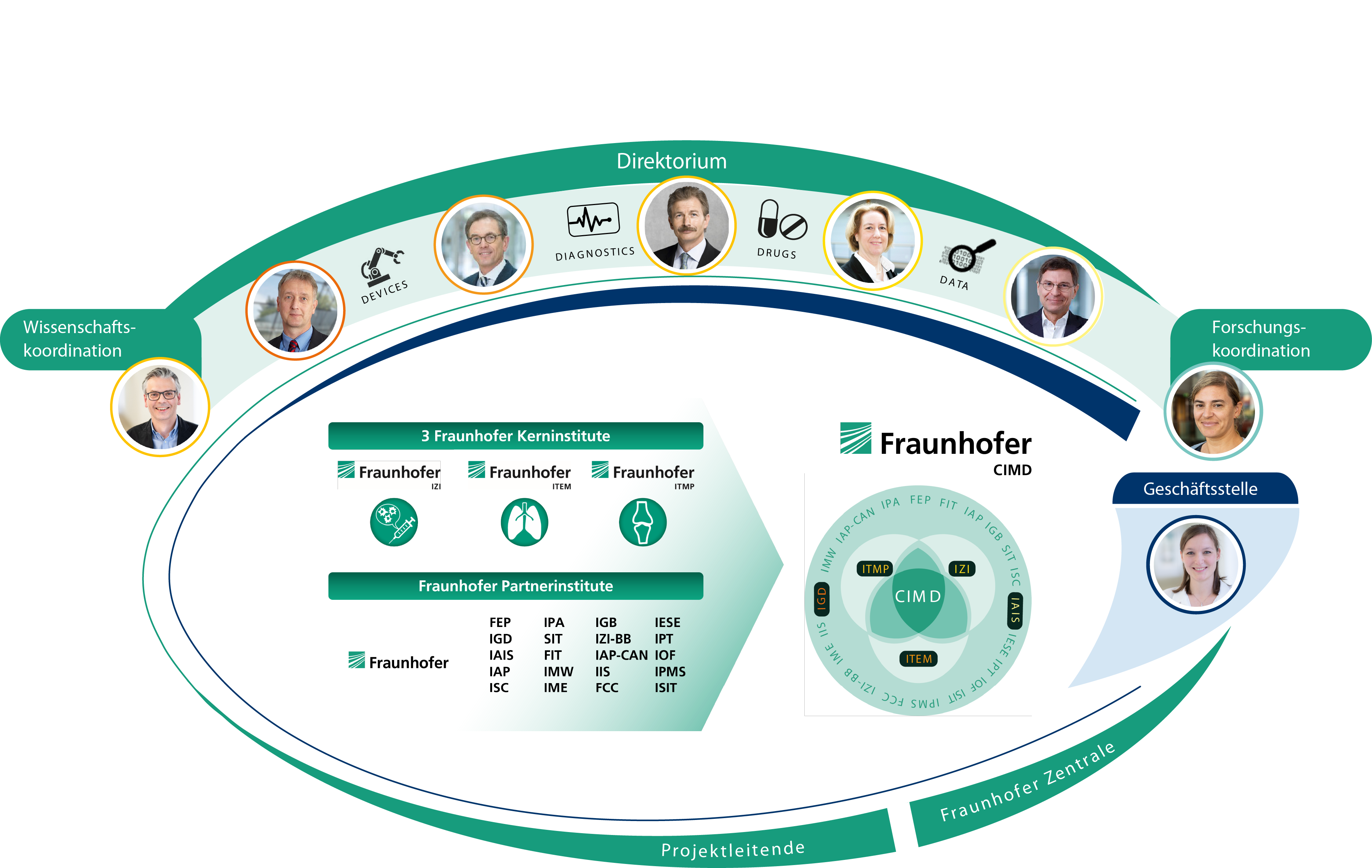
The Fraunhofer CIMD

Who we are - How are we organized?
The Fraunhofer Cluster of Excellence Immune-Mediated Diseases CIMD combines the expertise of three Fraunhofer core institutes (Fraunhofer IZI, Fraunhofer ITEM and Fraunhofer ITMP) and approximately 14 Fraunhofer partner institutes to conduct research on future-oriented projects to improve health care together with cooperation partners from universities, research communities and industry. Fraunhofer CIMD is managed by a board of directors consisting of the directors of the core institutes and two selected partner institutes (“preferred partners”), as well as a scientific coordinator and a research coordinator. The central office is where all the threads come together – it is the first point of contact and coordinates all the processes to keep the work at Fraunhofer CIMD running.
In addition to our large number of dedicated, established employees, we are pleased to have young scientists on board who help shape our projects with new ideas and a thirst for knowledge.
And not to be forgotten: all the people who support us through their cooperation, e.g. by participating in studies, initiating project ideas, providing financial support, and much more, and thus make our scientific work possible in the first place.
If you would like to know more, click on the respective tile and find out who is behind it:
Our common goal: the translation of innovative ideas and identified targets into individualized therapies for immune diseases
The translation of innovative ideas and identified targets into individualized therapies for immune diseases
Autoimmune diseases affect about eight percent of the world's population. These diseases are very heterogeneous and can affect practically any organ or tissue. This group of indications includes, for example, rheumatoid arthritis, psoriatic arthritis, psoriasis vulgaris, systemic lupus erythematosus, atopic dermatitis and associated allergy-induced manifestations, but also chronic inflammatory bowel diseases, chronic respiratory diseases, systemic sclerosis and multiple sclerosis. The pathophysiological commonality of many of these diseases lies in a dysregulation of the immune system. Until now, immune diseases have mostly been treated symptomatically with drugs that non-specifically suppress the patient's immune system (immunosuppressive therapy). A causal and, ideally, individualized, curative therapy is currently not possible. There is a great need for research in terms of both pathophysiology and possible therapeutic target structures, which the Fraunhofer cluster of excellence “Immune-Mediated Diseases” (Fraunhofer CIMD) would like to address:
- Translation of innovative ideas and identified targets into individualized therapies for immune diseases
- Closing the current gap between drug research and patient care
- Developing new methods for diagnosis, addressing innovative targets, establishing new classes of therapies and gaining insights into the pathophysiology of immune disorders

Our route to the goal
Fraunhofer CIMD combines the Fraunhofer-specific strengths in the field of medical translation and inter- and transdisciplinarity across institute boundaries to make scientific findings on the complex function, dysregulation and modulation of the immune system usable. In this way, research findings on the early detection, diagnosis and new therapeutic options for immune diseases are made accessible to patients.
Fraunhofer CIMD focuses on a systems medicine approach to the cellular and molecular understanding of immune reaction functions and disorders, independently of the clinically and symptomatically affected organ. Fraunhofer health research combines the most important aspects in the four large, interrelated areas of expertise, the so-called 4 Ds (drugs, data, diagnostics, devices).
downloadable materials
Fraunhofer Cluster of Excellence
The Fraunhofer clusters of excellence promote the cooperative development and processing of system-relevant topics through a cross-institutional research structure. Up to four core institutes and a varying number of partner institutes work together in a cluster of excellence, further expanding the Fraunhofer network in the process.
In January 2018, four Fraunhofer clusters of excellence were launched for the first time:
“Programmable Materials”, “Advanced Photon Sources”, “Cognitive Internet Technologies” and “Immune-Mediated Diseases”. They are intended to strengthen cutting-edge research at Fraunhofer.
Two further clusters of excellence followed: “Circular Plastics Economy” and “Integrated Energy Systems”.
The clusters of excellence are not tied to a specific location, but rather the core institutes involved form a virtual instrument, giving them a high degree of flexibility.
A list of all Fraunhofer clusters of excellence can be found at:
 Fraunhofer Cluster of Excellence Immune-Mediated Diseases
Fraunhofer Cluster of Excellence Immune-Mediated Diseases